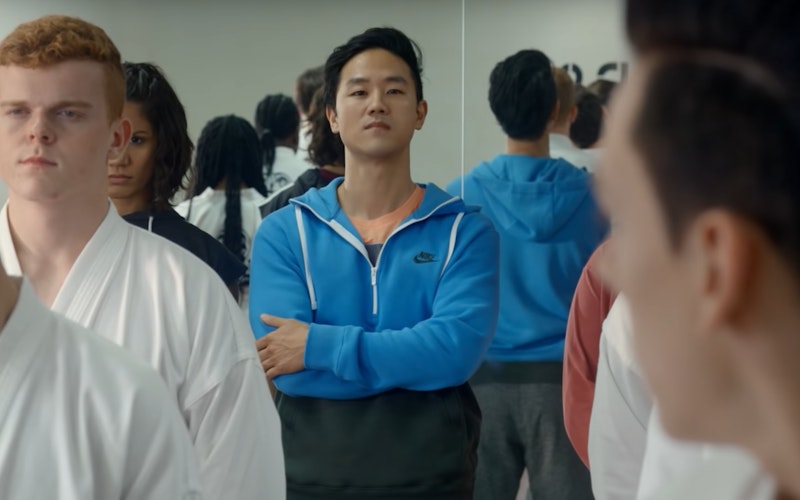
TV
Cobra Kai and an ‘Eye for an Eye’
The kids from Miyagi-Do arrive at a local arcade looking for one thing: payback. They get a taste of it, trading kicks against rival karate dojo, Cobra Kai. But after the fight, everyone is left worse off than before: mentally beaten, physically broken, and no closer to ending this feud.
Netflix's Cobra Kai is back for a third season and the stakes have never been higher for the All Valley karate kids. The campus-wide melee at the end of last season has landed one boy in the hospital, unable to walk, and another on the run for putting him there. One girl has been expelled for the permanent scars that she left another. The school has banned martial arts, a decision that parent-sensei Daniel LaRusso (Ralph Macchio) derides as “some kind of karate Footloose.”
Understandably, members of each camp are out for revenge—some to the point of obsession. But the series asks us to question a life driven by retribution. For many, the phrase “eye for an eye” is a biblical dictate that justifies inflicting pain on our enemies. But this popular interpretation ignores the full context of the sentiment, including when it's uttered in the Bible, and by whom. How we read and apply the phrase carries implications for the people we become and the society we wish to create.
The conflict at the center of Cobra Kai lies with a difference in philosophy. The eponymous dojo has always taken an aggressive approach to karate, instilling in its students a militant attitude that repudiates mercy. Meanwhile, Daniel’s late sensei, Mr. Miyagi (Pat Morita), taught karate primarily as a peaceful, reflective practice that, as a form of combat, should only be used in self defense. With Miyagi-Do, Daniel’s able to pass on these virtues to a new generation of students, while Cobra Kai founder John Kreese (Martin Kove) is here to “melt this whole snowflake generation.” Karate plays such a key role in the lives of these students that the approach of their respective dojo informs the way they see themselves in relation to others—especially their enemies.
The series asks us to question a life driven by retribution.
The Bible does appear to support severe punishment to those who do us harm. Moses is commanded by God to take “a life for life, eye for eye, tooth for tooth, hand for hand, foot for foot, burn for burn, wound for a wound, bruise for bruise.” But we often overlook that this—as well as related laws given in Exodus—are part of establishing a legal system for the burgeoning Israelite nation. They are not necessarily a prescription for spiritual development. The edict speaks to the ways in which the courts, rather than the individual, ought to respond to transgressions. It also rejects the use of excessive punishment motivated by personal biases; recoup only what was lost, and seek no more than an eye for an eye, a tooth for a tooth, and so forth. That fairness is what separates justice from revenge.
Jesus revisits these laws in his Sermon on the Mount. He challenges his audience to question conventional wisdom with regard to marriage, worship, love, and anger. To the notion of “an eye for an eye,” he adds, “If anyone slaps you on the right cheek, turn to them the other cheek also.” As to your opponents, “love your enemies and pray for those who persecute you.” This is not a call to defer justice, but rather a plea to put spiritual health ahead of hatred, for our own sake. Otherwise, we may find ourselves consumed by ill will and no better than those who have done us harm.
Consider Eli Moskowitz (Jacob Betrand) in Cobra Kai. At the start of the series, Eli is an awkward social reject, mercilessly teased for his prominent cleft lip scar. After joining Cobra Kai, sensitive Eli switches up his style and outlook, donning tattoos and a high, spiked mohawk. As “Hawk,” he develops into a skilled fighter and swoops in to attack anyone who’s ever humiliated him. He caps the battle at the arcade by breaking his best friend's arm—on purpose. And in one stunning scene, he pummels a former tormentor who is trying out for a spot in the dojo, spitting on him when he’s done, his bare knuckles covered in blood. While Hawk definitively beats his opponent, it’s tough to say that he actually wins. He doesn’t heal, emotionally; he’s still angry, constantly looking for his next fight. As tensions escalate this season between Hawk and his peers, he will need to decide if it’s worth it to continue on this path of destruction. All of us who have been wronged must make a similar choice.
Quoting Mr. Miyagi, Daniel tells his students that “if you’re looking for revenge, you can start by digging two graves.” He goes on to say that “if you have hate in your heart, then you’ve already lost.” In a time of extraordinary social division, many of us feel maligned by those we once considered neighbors, friends, allies, and leaders. And it’s easy to perceive the opposition as a threat to be neutralized, even if it means violence and destruction. It may feel cathartic to give as good as we get, and then some, yet violence always comes with a cost, to others and to ourselves. Even in holding others accountable for their wrongs, we must still exercise patience, love, and restraint. We must respond to the challenge of this moment in history rather than simply react to the moment. If we hope to establish lasting change, we must be led by justice rather than revenge.
Topics: TV